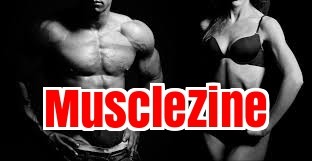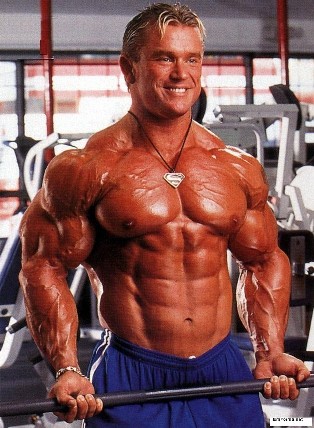Click Here to Sign Up for Your Free Muscle Magazine Subscription
The Rise and Fall of Lee Priest
The story of professional bodybuilder Lee Priest is a very interesting one, in my opinion anyway. One of the more controversial figures in the sinewy world of bodybuilding, Lee Priest is an athlete who entertains, provokes, amuses and most importantly – succeeds.
Lee is not one to bite his tongue, and has drawn much criticism for his attitude towards drug use in the sport. However, there remains an aura of mystery and greatness about the man who appropriately calls himself "The Blond Myth".
Growing up in Wallsend, Australia, under the watchful eye of his bodybuilding mother Lynn, Priest embarked upon his bodybuilding journey at the age of 12. Coached and supported by his grandfather, Lee took to the sport like a duck to water.
It didn’t take long for him to start making waves. In 1985, aged 13, the young bodybuilder entered his first competition and walked away with a winner’s medal. It was a sign of things to come; Priest was prolific throughout his teenage years, winning virtually every competition he entered. His body was incredibly advanced for his age, and even in his mid-teens he could boast muscle mass that was the envy of many older bodybuilders.
IFBB Career
Priest competed at the Australian Championships at the tender of age 17, and emerged victorious. He competed again the following year and won again, confirming his transition from “promising youngster” to bona-fide champion.
When Priest turned IFBB pro at the age of 20, he became of the youngest man ever to do so. The bodybuilding community was starting to take notice of this young athlete from suburban Australia.
Lee Priest was as diminutive a figure as a muscle-bound bodybuilder could be. Coming in at just 5ft 4in, he was placed at an immediate physical disadvantage against most of his rivals. Standing on stage, Priest regularly conceded several inches to his competitors, but what he lacked in height he compensated for in hard work and superman strength.
Priest continued to compete against athletes with much more experience than himself, and by the turn of the millennium he had placed in the top 10 at over 25 IFBB contests. He struggled to break into the highest echelons of the sport, though, winning just three IFBB competitions in his 16-year career. Then, in 2006, his career with the IFBB came to an abrupt end when he was subjected to a ban.
Banned from Competing & Mr Universe
The IFBB took the decision to ban Priest from all competition for a year after it emerged that he had competed in a rival promotion show, violating a contractual exclusivity cause in the process. Unsurprisingly, Priest argued the ban, a decision that led to it being increased to two years. Priest argued that he was being made an example of, and had been treated unfairly by a governing body who were out-of-touch with their athletes.
A seven-year absence from bodybuilding ensued for Priest, a period during which he turned his attention to other pursuits including doing the bodywork for The Incredible Hulk movie and appearing on Australian TV in various capacities. The strongman returned to bodybuilding in 2013 to compete in the National Amateur Body-Builders Association (NABBA) Mr Universe competition where he triumphed in the amateur category.
Following his victory, Priest promptly announced his retirement from bodybuilding for good.
There were widespread doubts about the authenticity of Priest’s statement; he had made several similar claims in the past, only to later return to the fold once again. For now, Priest is still in retirement at the time of writing this article though, and contributes a monthly column to MuscleSport Magazine’s online and print editions.
Steroid Use & Abuse
Since retiring, the Australian has admitted to frequent steroid abuse throughout his 20-year career. Priest defends his actions, claiming that steroids are painted in a bad light and are not as harmful as many would suggest. These claims have drawn criticism from many, including IFBB commentator Bob Cicherillo.
There is no denying the entertainment factor that Lee provides – he knows how to sell himself, and clearly enjoys the limelight. One of the ways in which Priest inadvertently kept himself in the limelight was through his outspoken view on the topic of drug-taking. Priest routinely defends the practice of steroid abuse, claiming that it is now commonplace and not as serious an issue as it is often made out to be.
Speaking to The Daily Telegraph in an interview in 2014, Priest claims that he’s seen steroid abuse across just about every sport imaginable. It’s a fascinating insight from a guy who clearly knows a thing or two about strength and conditioning, and one that should be acted upon. In the same interview, Priest also says that he sees young men on steroids 60 percent of the time he goes to the gym. The point he is trying to make is that “roid rage” is not an issue to be concerned about.
The use of steroids and other performance-enhancing drugs is often linked to aggressive behaviour – hence the term “roid rage” – but Priest claims that alcohol is a much more culpable for violence than drugs. He points out that most hospitals will have patients suffering from alcohol abuse, but it is very rare that you see someone hospitalized as a result of steroid use. Whether or not you agree with him, Priest seems to genuinely believe in what he says and is clearly passionate about the subject.
His Legacy
Priest is unlikely to ever feature in lists ranking the greatest bodybuilders of all time. Despite his early promise, Priest could never quite achieve a consistent set of winning results over a sustained period of time. Muscle men such as Ronnie Coleman, Dennis James and Flex Wheeler will be remembered for winning major competition after major competition, but Priest leaves a different sort of legacy.
There is no doubting the contribution that Priest made to the sport of bodybuilding in increasing its global profile, drawing in new fans and generating conversation. A polarising figure he may have been, but modern sport lacks authenticity of character and it is always refreshing to have individuals such as Lee Priest to keep us on our toes.
Whether his name stands the test of time remains to be seen; few do, and even fewer are remembered for their achievements alone. But he raised the profile of the sport, and he entertained us all along the way, and for that we must be forever grateful.
Click Here to Sign Up for Your Free Muscle Magazine Subscription

